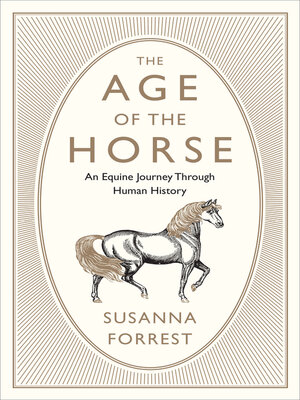
Sign up to save your library
With an OverDrive account, you can save your favorite libraries for at-a-glance information about availability. Find out more about OverDrive accounts.
Find this title in Libby, the library reading app by OverDrive.



Search for a digital library with this title
Title found at these libraries:
| Library Name | Distance |
|---|---|
| Loading... |
A “superb” account of the enduring connection between humans and horses—“Full of the sort of details that get edited out of more traditional histories” (The Economist).
Fifty-six million years ago, the earliest equid walked the earth—and beginning with the first-known horse-keepers of the Copper Age, the horse has played an integral part in human history. It has sustained us as a source of food, an industrial and agricultural machine, a comrade in arms, a symbol of wealth, power, and the wild.
Combining fascinating anthropological detail and incisive personal anecdote, equestrian expert Susanna Forrest draws from an immense range of archival documents as well as literature and art to illustrate how our evolution has coincided with that of horses. In paintings and poems (such as Byron’s famous “Mazeppa”), in theater and classical music (including works by Liszt and Tchaikovsky), representations of the horse have changed over centuries, portraying the crucial impact that we’ve had on each other.
Forrest combines this history with her own experience in the field, and travels the world to offer a comprehensive look at the horse in our lives today: from Mongolia where she observes the endangered takhi, to a show-horse performance at the Palace of Versailles; from a polo club in Beijing to Arlington, Virginia, where veterans with PTSD are rehabilitated through interaction with horses.
“For the horse-addicted, a book can get no better than this . . . original, cerebral and from the heart.” —The Times (London)
Fifty-six million years ago, the earliest equid walked the earth—and beginning with the first-known horse-keepers of the Copper Age, the horse has played an integral part in human history. It has sustained us as a source of food, an industrial and agricultural machine, a comrade in arms, a symbol of wealth, power, and the wild.
Combining fascinating anthropological detail and incisive personal anecdote, equestrian expert Susanna Forrest draws from an immense range of archival documents as well as literature and art to illustrate how our evolution has coincided with that of horses. In paintings and poems (such as Byron’s famous “Mazeppa”), in theater and classical music (including works by Liszt and Tchaikovsky), representations of the horse have changed over centuries, portraying the crucial impact that we’ve had on each other.
Forrest combines this history with her own experience in the field, and travels the world to offer a comprehensive look at the horse in our lives today: from Mongolia where she observes the endangered takhi, to a show-horse performance at the Palace of Versailles; from a polo club in Beijing to Arlington, Virginia, where veterans with PTSD are rehabilitated through interaction with horses.
“For the horse-addicted, a book can get no better than this . . . original, cerebral and from the heart.” —The Times (London)







